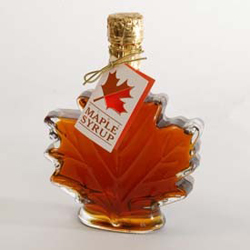
Acording to an article in the Huffington Post, the two US Senators from Vermont are sponsoring a bill designed to let you know what you’re buying (here’s a hint: probably not real maple syrup) and to protect the state’s $30 million industry by making falsely labeling other things (usually cane syrup with some kind of flavoring) as maple syrup a felony punishable by five years in jail.
The state already protects their investment, as evidenced by their accusations against the familiar Log Cabin All Natural Syrup:
Earlier this year, Vermont went after the maker of Log Cabin All Natural Syrup, asking the U.S. Food and Drug Administration to investigate whether the company violated federal guidelines by marketing the product as a natural one, noting that the ingredients included caramel color, xanthan gum—a natural thickener—and 4 percent maple syrup.
Log Cabin subsequently removed the caramel coloring from the product. But still, when you buy something that looks like a maple syrup container, as Log Cabin does, you expect it to contain more than 4% of the real thing. And that’s what has the Vermonters in an uproar.
Pure maple syrup, the real deal, sells for about $50/gallon. So if you’re getting a price that looks too good to be true, it probably is. (And if you’ve never had the real deal, get some as soon as you can—you’ll realize what a heinous crime the fake stuff is.)

Calmly containing all the “inappropriate legislation rage” that is building. So what would be the next step? Cracking down on the fruit juice industry? Those nafarious folks at Juicy Juice are up to something, I just know it!
A lot of the problem here is that there is a very loose legal definition of “all-natural” so really you could slap that on any product and be fine as wine. I know this mainly because I have family in MS that are “all-natural” sweet potato farmers.
You’d be amazed at how many such pieces of legislation already exist–what percentage of coffee has to be grown in Hawaii b4 it can be called “Hawaiian coffee”, where Vidalia Onions have to be grown, etc. This legislation is really aimed at not so much the “all natural” label as the “maple syrup” label. Most of what you buy in the story is cane syrup with maple flavoring. The Vermont Maple Syrup people think that should have to be labeled loud and clear–without big maple leaves on the packaging.